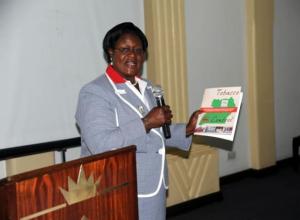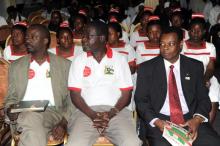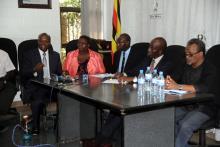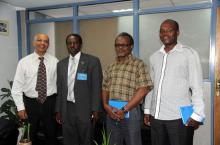Uganda commemorates World no Tobacco Day 2013
Uganda joined the rest of the world to commemorate World No Tobacco Day (WNTD) on 31st May 2013 under the theme: “Ban All Tobacco Advertising, Promotion and sponsorship”.
The commemoration marks 26 years since the declaration by WHO to observe a “World No Tobacco Day” once annually. It also marks 10 years since Nations unanimously adopted the Framework Convention on Tobacco Control (FCTC).
For Uganda, which ratified the Framework Convention on Tobacco Control in 2007, a comprehensive ban on advertising, promotion and sponsorship (Article 13 of the FCTC) is not an option. It is commitment, which must have been evident within five years of ratification as prescribed in the FCTC.
Reflecting on the theme the Minister of Sate for Health (General Duties) Hon Sarah Kataike who was the Guest of Honour at the commemoration noted that the Government of Uganda will work through the Ministry of Health to do whatever it takes to enforce a comprehensive ban on all forms of advertising, promotion and sponsorship of tobacco products to counteract the aggressive marketing by the Tobacco Industry.
“Through collaboration of relevant sectors Government will develop mechanisms to counteract current trends and innovation used by the Tobacco Industry to covertly advertise and promote products, including the internet and other modern technology like mobile phones” she said.
sensasib [at] ug.afro.who.int (sensasib[at]ug[dot]afro[dot]who[dot]int)
Honourable Kataike expressed particular concern about tobacco advertisements through the internet that do not carry any health warnings, thus putting many users at high risk. She pointed out that health is an absolute right, which is guaranteed by the constitution of Uganda. No commercial interests of any nature should, therefore, be allowed to compromise that right.
“I am aware that all international agreements on trade have provisions to protect the health of citizens by prioritizing health above commercial interests,” she said, adding that Uganda’s comprehensive ban will take that as the paramount consideration.
Regarding the Private Member of Parliament’s Tobacco Control Bill, currently in Parliament, the Minister said Government will do whatever is within its powers to honour its obligations as a party to the WHO - Framework Convention on Tobacco Control (FCTC) and support the enactment of the bill without reservations.
Concerning the Country’s legal and coordination framework in the implementation of the Uganda’s obligations to the WHO - FCTC, the Minister reported that the Ministry of Health is formulating a policy to put in place a tobacco control committee with all the relevant key stakeholders to address the issue.
For current tobacco users who wish to quit the habit, the Minister revealed that her Ministry has already initiated training of health workers in tobacco use cessation, and called upon other actors to provide services such as quit lines. She also urged Civil Society Organisation to monitor and counteract any form of Tobacco Industry interference in the formulation of tobacco control policy.
To the many tobacco farmers confined to poverty due to the monopoly of the tobacco companies, the Minister called for more information and education so that they can appreciate their peril and free themselves from the Industry bondage. “It is well documented from research that tobacco harms the health of farmers, causes food insecurity and degradation of the environment and soils” she emphasised that the farmers must be helped to understand this problem.
The commemoration of World No Tobacco day was the culmination of week-long of activities that included a media dialogue, dissemination of a ‘Shadow Report’ on Tobacco Advertising, promotion and sponsorship, a tobacco symposium and an awareness raising match through the streets of Kampala led by WHO Country Representative, Dr Wondimagegnehu Alemu and other dignitaries.
Other commemoration activities included presentations on tobacco control, testimony by a former smoker and street distribution of IEC materials.
WHO Urges Government to Implement FCTC Article 13
Speaking on the same function, Alemu, emphasised that a total ban on all forms of tobacco advertising, promotion and sponsorships by the Tobacco Industry is urgently required, to reduce the high risks and premature deaths associated with tobacco use.
“Comprehensive advertising ban is one of the most cost effective strategies to reduce tobacco demand and thus prevent ill health and deaths. Ban of advertising and promotions leads to reduction in the numbers of people, particularly the youth, who are lured to start smoking, and benefit people who wish to stop tobacco use achieve their goal” He pointed out.
Dr Alemu called upon the Government of Uganda to implement the WHO FCTC- Article 13 and its Guidelines to comprehensively ban tobacco advertising, promotion and sponsorship by crafting firm policy and deterrent legislation to that effect.
“We must stand up against the Tobacco Industry and stop it from undermining tobacco control. Specifically, we must take on the Tobacco Industry that seems set to derail efforts to enact a comprehensive tobacco control law in Uganda” he added.
In such endeavours public awareness is going to be central, and for that Dr Alemu urged Government and civil society to devise and implement effective public awareness raising campaigns so that people appreciate fully the benefits of not promoting tobacco.
Dr Alemu reminded the audience that advertising and promotion by the Tobacco Industry has become more and more artful and highly sophisticated, and the public must know and counter all forms of indirect advertising that the Industry uses. He specifically mentioned tobacco labels at points-ofsale, display and handouts of various objects carrying tobacco logo and misleading information on tobacco products and their use.
To the communities, Dr Alemu cautioned to particularly watch out and shun corporate social responsibility activities by the Tobacco Industry. These, he said, are intended to sway public opinion, and soften law enforcers, or hijack legislative process.
Dr Alemu also advised Ugandan authorities to be on the lookout and stop the prevailing cross-border advertising and promotion of tobacco. “This is often covertly done by the Industry and must be subjected to the same laws and penalties as local promotional activities” he said.
He finally requested all health loving people to raise concern, not only on tobacco advertising, but also refuse to be exposed to tobacco smoke, to prevent children and youth from handling tobacco products, and call for Government to make tobacco products not readily accessible, by imposing a deterrent excise tax.
WHO Regional Director Bans Smoking on All WHO Premises
Meanwhile, as countries mark this year’s World No Tobacco Day, the WHO Regional Director for Africa, Dr Luis Sambo, has declared smoke-free all WHO premises in the African Region namely, outdoor and indoor premised at the Regional Office, Inter-Country Support Teams and Country Offices. The ban takes
effect starting 31st May 2013. In that regard all staff members, visitors and delegates are to be immediately informed about this new directive. In addition, appropriate and clear “No Smoking” signs are to be posted at all WHO premises and ashtrays should be removed from all offices.
________________________________________________________________
For more information please contact :
Benjamin Sensasi, Health Promotion Advisor, WHO Country Office
Tel 256-41-334400
Email: sensasib [at] ug.afro.who.int (sensasib[at]ug[dot]afro[dot]who[dot]int)







